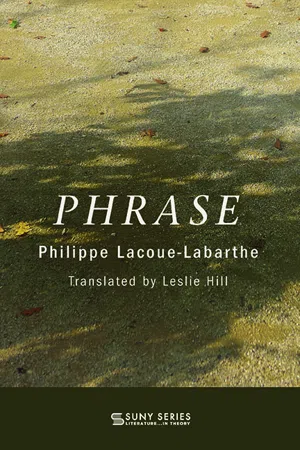![]()
PHRASE
“Who else for, if not for you?”
Phrase I
… let—let it come (or yield, more likely,
or else well up, though barely so),
that which won’t come and can’t reach where it’s going, if only
for lack of an infallible shoreline
and because it’s clear that in you, somewhere else,
not a place where you get upset, is where it streams
or collapses (I don’t know, I think
of a face exhausted, betrayed, drenched with tears,
etc.—of a gesture, in fact, of supplication),
let, yes, let that which did not take place
grow old in you and wane:
we are held or constrained to it, just as we are to the
things that can’t be undone, which separate us, each forever
beside the other, and bind us, each apart from the other;
for what makes us vulnerable is that the echo within us should be of almost
no voice, and that the things around us
(this garden, for instance, here,
this meadow, ever the same)
bear the trace, of course, of no passage.
And don’t say: it’s dreadful—“don’t implore,”
don’t be frightened either.
It is, admittedly, irrevocable, and we are
indisputably abandoned. But accept, all the same,
“don’t look away,” accept, as when
you hold your head up, shamefaced, knowing nothing
of what is causing your downfall, accept this slow disaster
or exodus, rather, which is more or less all we are.
(July 20, 1976)
Phrase II
(A Clarification)
1
Phrase: what has been speaking within me—far away, elsewhere, almost outside—for a very long time,
ever since, I believe, I was given the possibility of forgetting,
this I call literature.
It’s—empty of meaning, deprived most of the time of content,
barely organized into words—just
a phrase. Practically
always the same, it seems to me; but I can’t
say anything about it positively.
It, the phrase, is modulated in different ways: as
lament, jubilation, disarray, energy, fatigue.
Adoration too. I’ll say more about this later.
And yet, I don’t have the sense of ever having been given it.
Never entirely. I don’t think that I’m responsible for producing
it either. It is likely that in the language
to which I’m subjected and to which, vaguely, and
with difficulty, I am forever being born and to which I am forever dying,
in the same way as I am to things, to other people, and to whatever I’m said to be,
it reaches far back to some story long ago,
deeply buried, and inaccessible to thought: an ancient scribble beyond memory,
an old indistinct murmur counting out
the generations.
I rather think, then, that it—the phrase, I mean—is still seeking its proper form
and has never, in fact, come to an end. Never
in any case have I heard it. On the contrary, I
suspect that if at times I do happen to hear certain words,
a kind of diction or a sort of music, it is because
of this phrase still waiting, indefinitely,
for its conclusion and its closure.
If pressed, that is, at those moments of terrifying oblivion when the merest winter light falling on a wall, or grass growing sparsely in a garden, or water flowing in a river, is a pure sign, like a hiatus, that I am going to die, I might say (and this too would speak, in silence, and be captured in the phrase): I will have been a phrase.
Or rather: there will have been a phrase, this phrase—which will have haunted me, and never crossed my lips.
This abortive utterance, this sense of being haunted, this decidedly I call literature.
2
The tale I should like to tell (or recite: it’s perhaps, unfortunately, a kind of myth) is thus a tale of renunciation.
To “renounce” originally meant: to announce or enounce. To “phrase,” in Greek, more or less says the same. Today, however, to “renounce” means: no longer to want, to accept. As one accepts one’s destiny or fate: that which has already been spoken.
Let us assume therefore that one has to learn to renounce, slowly; no longer to want to utter.
Then, there can be a phrase: always the same, never itself; returning from afar, multiple and halting.
It follows that nobody is a prophet in their own language.
Ten years or so have passed.
At the present time, amid the general devastation, the distress could not be greater. A simple historical observation: there is nothing new in this. Or the opposite. Look around you. Above all, listen.
The fact remains that what comes to pass, and passes us by, is still an enigma.
The beginning always comes too late. And yet all it needed was a hand placed on the nape of your neck (without the least authority, without the least submissiveness), a laconic “I’ll explain later,” a whole night spent (till the pale glimmer of dawn) in approximations, in the sound and silence of voices, in the limpid tale of what we did not know about each other and still do not know.
On each occasion, less—much less—may be required. The approximations are endless, but however vulnerable we are, we are constrained to admit it.
This infinite paraphrase I also call literature.
3
Ten years ago—somebody remembers, and heard it—it resonated, like something midway between a prayer and a speech, or like the echo,
for instance, of this
(and that it should be about exile, separation, unacceptable renunciation, is anything but indifferent, as is the enjambment, the sentence spilling over from one line to the next):
… how shall we bear,
My Lord, our sundering across so many seas?
Or that the day should begin again and that it should end …
etc.
(Just as later there’ll be: “Andromache, I think of you”; or else “torn from a husband’s arms.”)
Between a prayer and a speech: what, according to the dictionary, used to be called an “orison.”
If ever the renunciation could be achieved, it would be as or...




